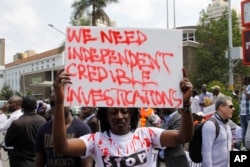A new report says Kenyan authorities are systematically curtailing civil liberties by targeting defenders of civil rights. The authors are concerned about the impact that the trend might have on Kenya's 2017 elections.
Rights activists have complained for years about alleged extrajudicial killings by Kenyan police. Criticism intensified after the killings this June of human rights lawyer Willile Kimani, his client and their driver.
The new report on civil liberties is the result of a fact-finding mission by an umbrella group, the World Organization Against Torture.
Benson Olugbuo was a mission delegate and is executive director of the CLEEN Foundation, an organization that agitates for what it calls "accessible justice." Speaking to reporters Friday in Nairobi, Olugbuo said Kenya needs police and judiciary reform if the country's civil liberties are to remain intact.
'Sustained' reform
"So we are asking for police reform which is sustained, because it is not a day's business, it's a process," he said. "We are also asking that agencies that are independent should also be allowed to work and that where there are grievances, people should have that right to go to court, to go to police to report." He also said Kenyans' right to demonstrate, "which is provided for in the constitution, should be protected."
The new report was compiled after the mission met with representatives of civil society groups, the police, the judiciary and the European Union delegation in Kenya.
Samuel Mohochi, the executive director at the International Commission of Jurists, Kenya chapter, said democratic gains made over the years are slowly being eroded by authorities, and advocates for civil liberties are being silenced.
"I think the increasing or rising levels of intolerance in society, especially for specific duty bearers or actors, would then create a fertile ground for increased intolerance to criticisms, and therefore that in itself is a clawback to democratic gains," he said. "And it starts slowly. Before you realize it, you are in a police state, so these are things that should be flagged at the earliest opportune moment."
81 disappearances
The Kenya National Commission on Human Rights (KNCHR) is an autonomous public body charged with redressing human rights violations. Commission Chairperson Kagwiria Mbogori says that in the past year, KNCHR has presented 81 cases of forced disappearances to the inspector general, the attorney general's office and the director of public prosecutions for action.
Mbogori says that proving who is behind the disappearances is becoming extremely hard.
"The act of disappearance can be explained in a number of ways," Mbogori said. "It may be some people have been killed and their bodies have never been found, but it is impossible to really narrow down and point a finger to a particular culprit or culprits. This is very saddening, and right now we are dealing with citizens who have encountered this, and it's very harrowing. It is worse than death, because you don't know if your loved one has died or whether they are somewhere suffering or where they went, et cetera. The uncertainty is terrible."
The World Organization against Torture says the elections slated for 2017 could prove fatal if the trend of silencing civil society continues unabated.
Around 1,100 people were killed in violence after the 2007 elections, with another 600,000 displaced.
Next year's vote is scheduled for August. New members of Kenya's electoral commission are set to take office this December.





